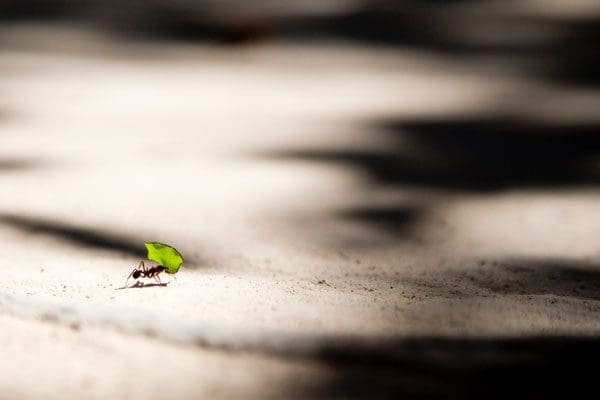He Is Slow to Start
The sluggard does not plow in the autumn;
he will seek at harvest and have nothing. – Proverbs 20:4
This proverb draws attention to the long-term effects of putting off the things we need to do now. There is a season for plowing, there is a season for sowing, and there is a season for reaping. Plowing is hard work and the sluggard does not want to do it.
Now, the context for this proverb is very important: When God’s people came into Canaan, every family was given a plot of land. God gave them homes they did not build, wells they did not dig, and vineyards they did not plant (Deuteronomy 6:11). God gave them the means of sustaining themselves. Everything they needed for life was theirs, and it was all given freely by the grace and abundance of Almighty God. Their part was to work the fields that God had given to them.
Working the fields that God had given was the work God had called His people to do. But the sluggard is slow to start. He does not plow in the autumn. So, the harvest-time eventually comes, and all of the sluggard’s neighbors are bringing in the grain and produce of the land that will sustain them, but this man has nothing. Perhaps this is why the book of Proverbs draws a contrast between the person who does not prepare for the future and the insects who do, for even insects to not have the problem that this man does.
Go to the ant, O sluggard; consider her ways, and be wise. Without having any chief, officer, or ruler, she prepares her bread in summer and gathers her food in harvest. – Proverbs 6:6-8
These tiny insects are wise enough to know that what you do now relates to what you will have in the future. Little ants know that you need to prepare for the future, so they work without supervision, and thus serve as an example for us. The unproductive person needs to be supervised all the time, but ants see what needs to be done, and they get on with doing it. But compared to these industrious ants, the sluggard delays. He postpones and procrastinates. He says, “It’s not good weather today. I’ll get around to my plowing tomorrow,” and of course he never does.
Whoever works his land will have plenty of bread,
but he who follows worthless pursuits will have plenty of poverty.
– Proverbs 28:19
He Is Easily Distracted
What keeps the sluggard from doing the work that God has called him to do and stewarding that which God has trusted him? The thing that keeps the sluggard from this is that he is easily distracted. He lacks focus. He follows worthless pursuits, and of course, this is the kind of person who is fascinated with everything but invariably achieves nothing.
We live in a world of constant distraction, from the beginning of our morning till the end of the day. The reason this sluggard has nothing at harvest is not that he refused to work; it simply that he just never quite got around to doing it.
How long will you lie there, O sluggard?
When will you arise from your sleep?
A little sleep, a little slumber, a little folding of hands to rest.
– Proverbs 6:9-10
Notice it’s just a little sleep. He says, “I’ll get around to the plowing when I’m ready, but right now I just feel like a little sleep. Indeed, not even sleep: I just want to have a little snooze first. Well, not even a little snooze. Just let me have a few minutes in my chair with my hands folded. Then I’ll get it done.” But after that, there is another distraction. He says, “I’ll just do this first, and then I will get around to the plowing.”
This person makes too many concessions, too many postponements, too many delays. It all happens “little by little,” and his life slips away. So, the sluggard has no harvest; not because he made some grand decision not to plow, but because, through a thousand small concessions to his own flesh, he never got around to doing what God had called him to do.
He Does Not Finish
Whoever is slothful will not roast his game,
but the diligent man will get precious wealth.
– Proverbs 12:27
Clearly the person who is slow to start, and is easily distracted, won’t be able to finish. Here the sluggard does get started, and he finds some food and brings it home. But then he loses interest and moves onto something else. So, he never finds time to roast the game he brought home.
The pattern of this person’s life is that he is always moving onto something else. Something new catches his eye and off he goes, leaving behind him a trail of incomplete projects and unfinished business. There are many things that he started but did not continue, and thus he never completed those things. And as a result, this takes us to a fourth mark of the unproductive person.
He Never Rests
Here is the irony of the person who keeps putting off what needs to be done: He can never rest. Even when he sleeps, he never really rests, because always in the back of his mind, he knows what he has to do. God rested when completed His work, and the price of putting off what God has called you to do is that you never really rest, no matter how long you may sleep.
The soul of the sluggard craves and gets nothing,
while the soul of the diligent is richly supplied.
– Proverbs 13:4
Notice that this proverb is about the soul. Not only the barns of the sluggard are empty; the soul of the sluggard is empty as well. Laziness will empty your wallet, but it will do something worse also. Laziness will hollow out your soul, because constantly avoiding what God has called you to do is soul-destroying.
This is why “the soul of the sluggard craves.” The sluggard wants a harvest, but he won’t do what it takes to get one, so he gets nothing. He would like to be like his neighbors, but he does not have a harvest, and he won’t do what he has to do to get one.
No one wants to be like the sluggard. But his profile gives us a really helpful grid for understanding what it takes to be a more productive person. Here are four questions for you to consider as you organize your work this week: What do I need to begin? Where do I need to stay focused? What do I need to complete? When do I need to rest?
This article was adapted from Pastor Colin’s sermon, “Work,” from his series Wisdom For Life.
Photo Credit: Unsplash








